Intro
Unlock a rewarding career as a Medical Health Records Technician. Learn about the vital role of organizing and maintaining accurate patient records, and discover the skills and training required for success in this in-demand field, including medical coding, data analysis, and healthcare IT.
In today's healthcare landscape, accurate and efficient management of medical records is crucial for providing high-quality patient care. Medical Health Records Technicians play a vital role in ensuring the confidentiality, accuracy, and accessibility of patient data. As the demand for skilled healthcare professionals continues to rise, a career as a Medical Health Records Technician has become an attractive and rewarding option for those passionate about healthcare and information management.
The Importance of Medical Health Records Technicians
Medical Health Records Technicians, also known as Health Information Technicians, are responsible for collecting, analyzing, and protecting patient data. They work closely with healthcare providers, insurance companies, and other stakeholders to ensure that medical records are accurate, up-to-date, and compliant with regulatory requirements. The work of Medical Health Records Technicians has a direct impact on patient care, as accurate and timely access to medical records can help prevent medical errors, improve treatment outcomes, and enhance patient safety.
Career Benefits and Job Outlook
A career as a Medical Health Records Technician offers numerous benefits, including:
- Job stability and growth: The demand for skilled Health Information Technicians is expected to increase by 13% through 2030, much faster than the average for all occupations.
- Competitive salary and benefits: Medical Health Records Technicians can earn a median salary of around $40,000 per year, with opportunities for advancement and higher pay.
- Variety and challenge: Medical Health Records Technicians work with diverse patient populations and healthcare providers, ensuring that every day is unique and engaging.

Education and Training Requirements
To become a Medical Health Records Technician, you typically need to complete a post-secondary training program in health information technology. These programs, which can be found at community colleges, vocational schools, and online institutions, typically include coursework in:
- Health information management
- Medical terminology
- Anatomy and physiology
- Coding and classification systems
- Health information technology
Many employers also require Medical Health Records Technicians to obtain certification, such as the Registered Health Information Technician (RHIT) or Certified Coding Specialist (CCS) credentials.
Certification and Professional Development
Certification is an important step in establishing your credibility and expertise as a Medical Health Records Technician. The American Health Information Management Association (AHIMA) offers several certifications, including the RHIT and CCS credentials. These certifications demonstrate your knowledge and skills in health information management and can help you advance your career.
Key Skills and Qualities
To succeed as a Medical Health Records Technician, you'll need to possess:
- Strong analytical and problem-solving skills
- Attention to detail and accuracy
- Excellent communication and interpersonal skills
- Ability to work independently and as part of a team
- Knowledge of health information management principles and practices
- Familiarity with coding and classification systems
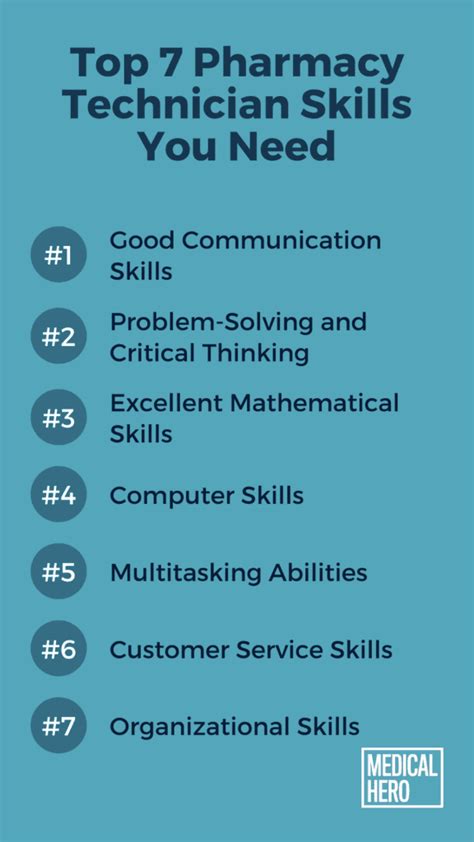
Work Environment and Specializations
Medical Health Records Technicians can work in a variety of healthcare settings, including hospitals, clinics, physician practices, and nursing homes. They may also specialize in areas such as:
- Coding and classification
- Health information management
- Clinical data analysis
- Healthcare IT project management
Future Outlook and Emerging Trends
The healthcare industry is rapidly evolving, driven by advances in technology, changes in regulations, and shifting patient needs. As a Medical Health Records Technician, you'll need to stay up-to-date with emerging trends and developments, including:
- Electronic health records (EHRs) and health information exchanges (HIEs)
- Big data analytics and artificial intelligence
- Patient engagement and empowerment
- Value-based care and population health management
Medical Health Records Technician Image Gallery
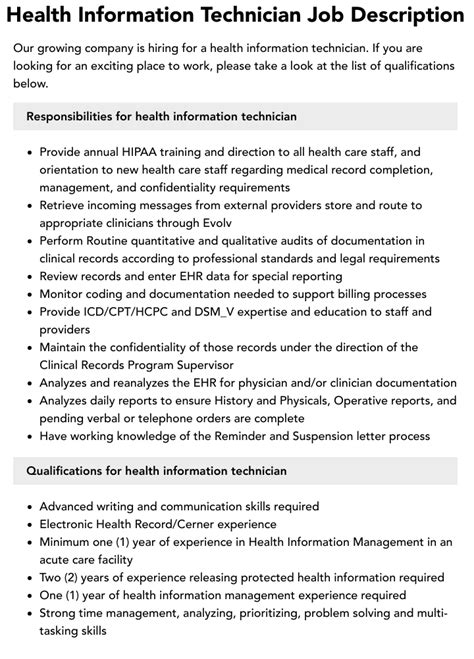
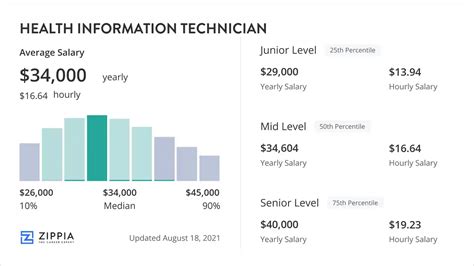
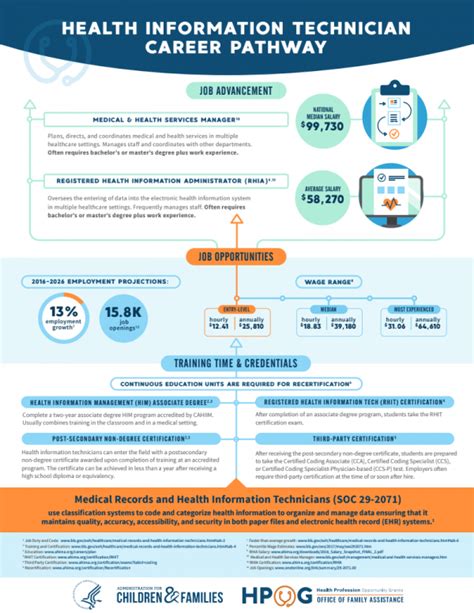
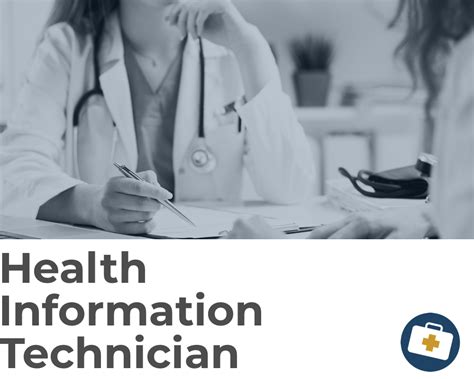

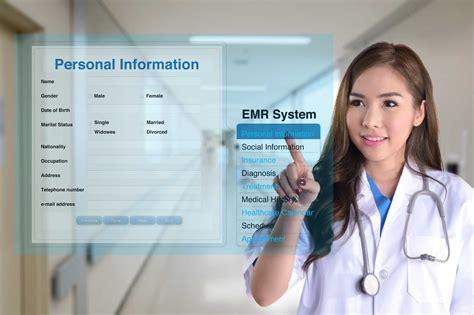
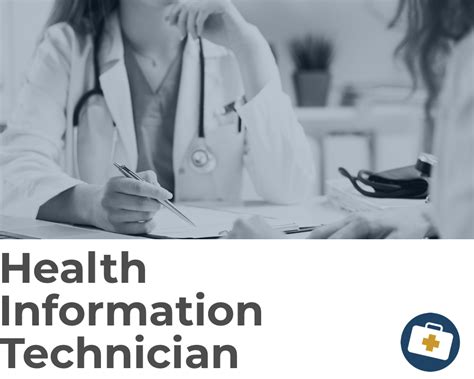
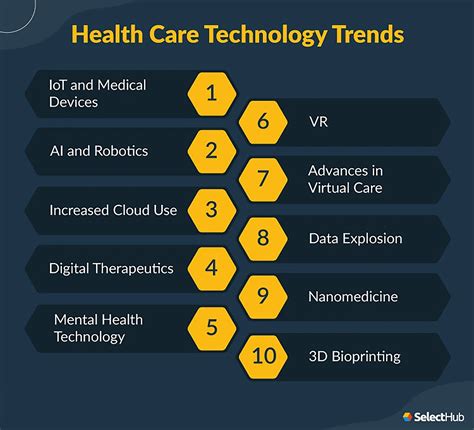
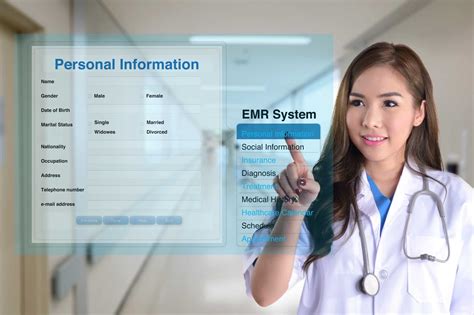
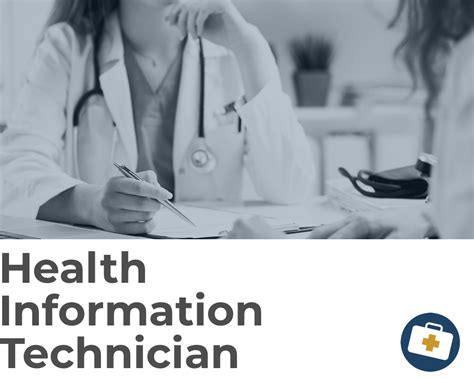
What is the average salary for a Medical Health Records Technician?
+The average salary for a Medical Health Records Technician is around $40,000 per year, although salaries can vary depending on location, employer, and level of experience.
What education and training are required to become a Medical Health Records Technician?
+To become a Medical Health Records Technician, you typically need to complete a post-secondary training program in health information technology, which can be found at community colleges, vocational schools, and online institutions.
What are the key skills and qualities required to succeed as a Medical Health Records Technician?
+Key skills and qualities required to succeed as a Medical Health Records Technician include strong analytical and problem-solving skills, attention to detail and accuracy, excellent communication and interpersonal skills, and knowledge of health information management principles and practices.
As a Medical Health Records Technician, you'll play a vital role in ensuring the accuracy and accessibility of patient data. With a strong foundation in health information management, you'll be well-equipped to navigate the complexities of the healthcare industry and make a meaningful contribution to patient care. Whether you're just starting your career or looking for a new challenge, a career as a Medical Health Records Technician is definitely worth considering.
